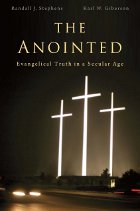
American evangelicalism often appears as a politically monolithic, textbook red-state fundamentalism that elected George W. Bush, opposes gay marriage, abortion, and evolution, and promotes apathy about global warming. Prominent public figures hold forth on these topics, speaking with great authority for millions of followers. Authors Stephens and Giberson, with roots in the evangelical tradition, argue that this popular impression understates the diversity within evangelicalism—an often insular world where serious disagreements are invisible to secular and religiously liberal media consumers. Yet, in the face of this diversity, why do so many people follow leaders with dubious credentials when they have other options? Why do tens of millions of Americans prefer to get their science from Ken Ham, founder of the creationist Answers in Genesis, who has no scientific expertise, rather than from his fellow evangelical Francis Collins, current Director of the National Institutes of Health?
Exploring intellectual authority within evangelicalism, the authors reveal how America’s populist ideals, anti-intellectualism, and religious free market, along with the concept of anointing—being chosen by God to speak for him like the biblical prophets—established a conservative evangelical leadership isolated from the world of secular arts and sciences.
Today, charismatic and media-savvy creationists, historians, psychologists, and biblical exegetes continue to receive more funding and airtime than their more qualified counterparts. Though a growing minority of evangelicals engage with contemporary scholarship, the community’s authority structure still encourages the “anointed” to assume positions of leadership.
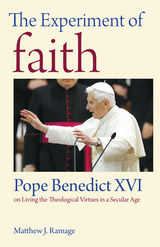
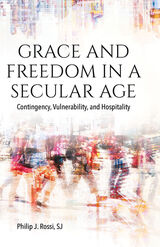
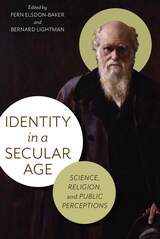

How Jesuit education can help students create meaningful connections in an age of secularism
In A Secular Age, the philosopher Charles Taylor challenges us to appreciate the significance of genuine spiritual experience in human life, an occurrence he refers to as “fullness.” Western societies, however, are increasingly becoming more secular, and personal occasions of fullness are becoming less possible.
In Jesuit Higher Education in a Secular Age, Daniel S. Hendrickson, SJ, shows how Jesuit education can respond to the crisis of modernity by offering three pedagogies of fullness: study, solidarity, and grace. A pedagogy of study encourages students to explore their full range of thoughts and emotions to help amplify their self-awareness, while a pedagogy of solidarity helps them relate to the lives of others, including disparate cultural and socioeconomic realities. Together, these two pedagogies cultivate an openness in students that can help them achieve a pedagogy of grace, which validates their awareness of and receptivity to the extraordinary spiritual Other that impacts our lives.
Hendrickson demonstrates how this Jesuit imaginary—inspired by the Renaissance humanistic origins of Jesuit pedagogy—educates students toward a better self-awareness, a stronger sense of global solidarity, and a greater aptitude for inspiration, awe, and gratitude.
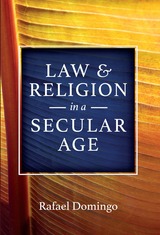
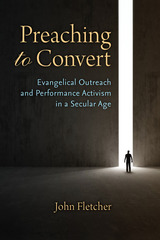
The book positions evangelicals as a diverse, complicated group confronting the loss of conservative Christianity’s default status in 21st-century U.S. culture. In the face of an increasingly secular age, evangelicals have been reassessing models of outreach. In acts like handing out Bible tracts to strangers on the street or going door-to-door with a Bible in hand, in elaborately staged horror-themed morality plays or multimillion-dollar creationist discovery centers, in megachurch services beamed to dozens of satellite campuses, and in controversial “ex-gay” ministries striving to return gays and lesbians to the straight and narrow, evangelicals are redefining what it means to be deeply committed in a pluralist world. The book’s engaging style and careful argumentation make it accessible and appealing to scholars and students across a range of fields.
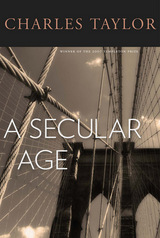
A New York Times Notable Book of the Year
A Times Literary Supplement Book of the Year
A Globe and Mail Best Book of the Year
A Publishers Weekly Best Book of the Year
A Tablet Best Book of the Year
Winner of a Christianity Today Book Award
“One finds big nuggets of insight, useful to almost anybody with an interest in the progress of human society.”
—The Economist
What does it mean to say that we live in a secular age? Almost everyone would agree that we—in the West, at least—largely do. And clearly the place of religion in our societies has changed profoundly in the last few centuries. In what will be a defining book for our time, Charles Taylor takes up the question of what these changes mean—of what, precisely, happens when a society in which it is virtually impossible not to believe in God becomes one in which faith, even for the staunchest believer, is only one human possibility among others.
Taylor, long one of our most insightful thinkers on such questions, offers a historical perspective. He examines the development in “Western Christendom” of those aspects of modernity which we call secular. What he describes is in fact not a single, continuous transformation, but a series of new departures, in which earlier forms of religious life have been dissolved or destabilized and new ones have been created. As we see here, today’s secular world is characterized not by an absence of religion—although in some societies religious belief and practice have markedly declined—but rather by the continuing multiplication of new options, religious, spiritual, and anti-religious, which individuals and groups seize on in order to make sense of their lives and give shape to their spiritual aspirations.
What this means for the world—including the new forms of collective religious life it encourages, with their tendency to a mass mobilization that breeds violence—is what Charles Taylor grapples with, in a book as timely as it is timeless.
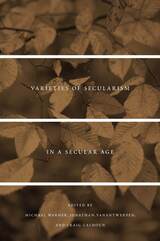
“What does it mean to say that we live in a secular age?” This apparently simple question opens into the massive, provocative, and complex A Secular Age, where Charles Taylor positions secularism as a defining feature of the modern world, not the mere absence of religion, and casts light on the experience of transcendence that scientistic explanations of the world tend to neglect.
In Varieties of Secularism in a Secular Age, a prominent and varied group of scholars chart the conversations in which A Secular Age intervenes and address wider questions of secularism and secularity. The distinguished contributors include Robert Bellah, José Casanova, Nilüfer Göle, William E. Connolly, Wendy Brown, Simon During, Colin Jager, Jon Butler, Jonathan Sheehan, Akeel Bilgrami, John Milbank, and Saba Mahmood.
Varieties of Secularism in a Secular Age succeeds in conveying to readers the complexity of secularism while serving as an invaluable guide to a landmark book.
READERS
Browse our collection.
PUBLISHERS
See BiblioVault's publisher services.
STUDENT SERVICES
Files for college accessibility offices.
UChicago Accessibility Resources
home | accessibility | search | about | contact us
BiblioVault ® 2001 - 2024
The University of Chicago Press









